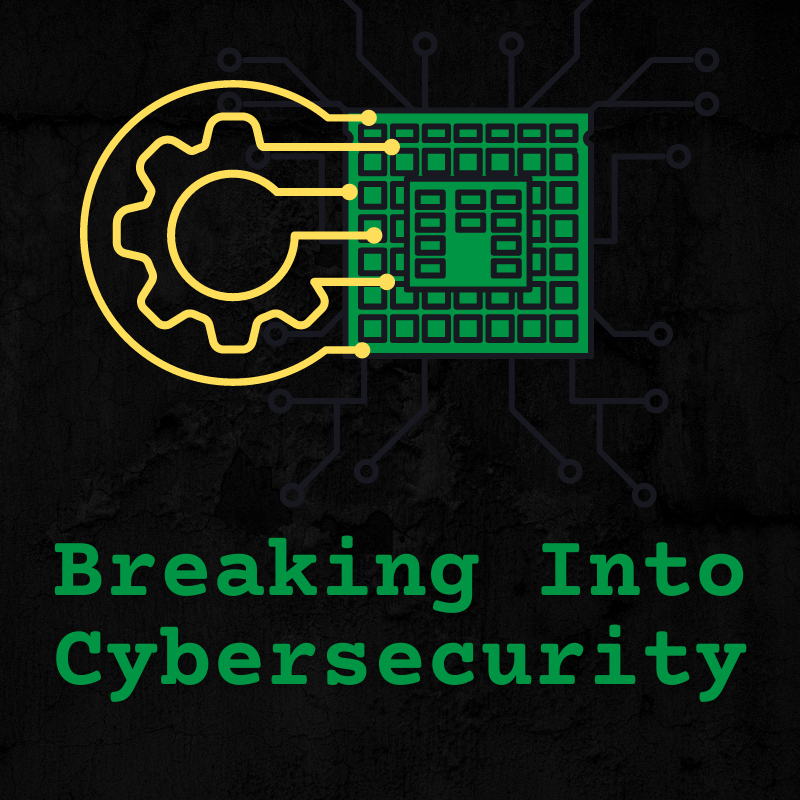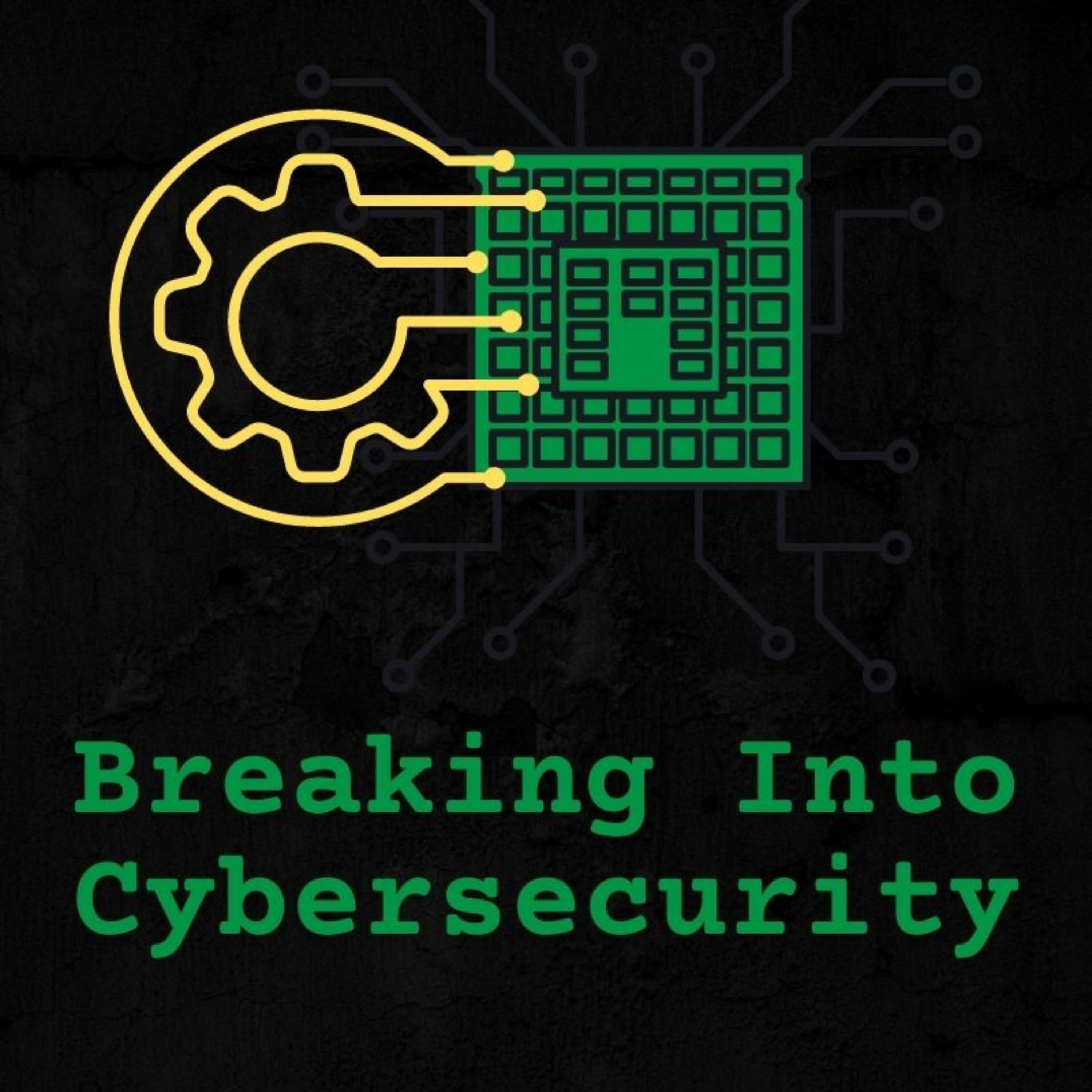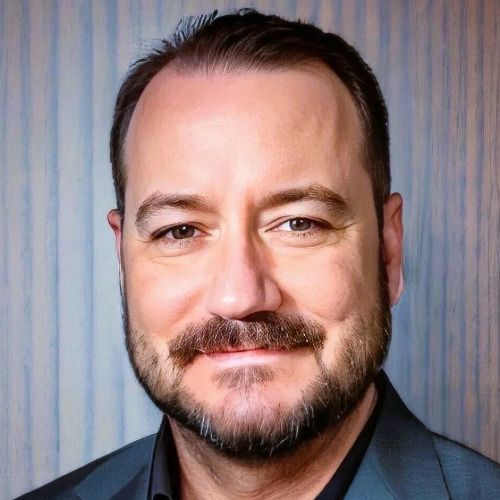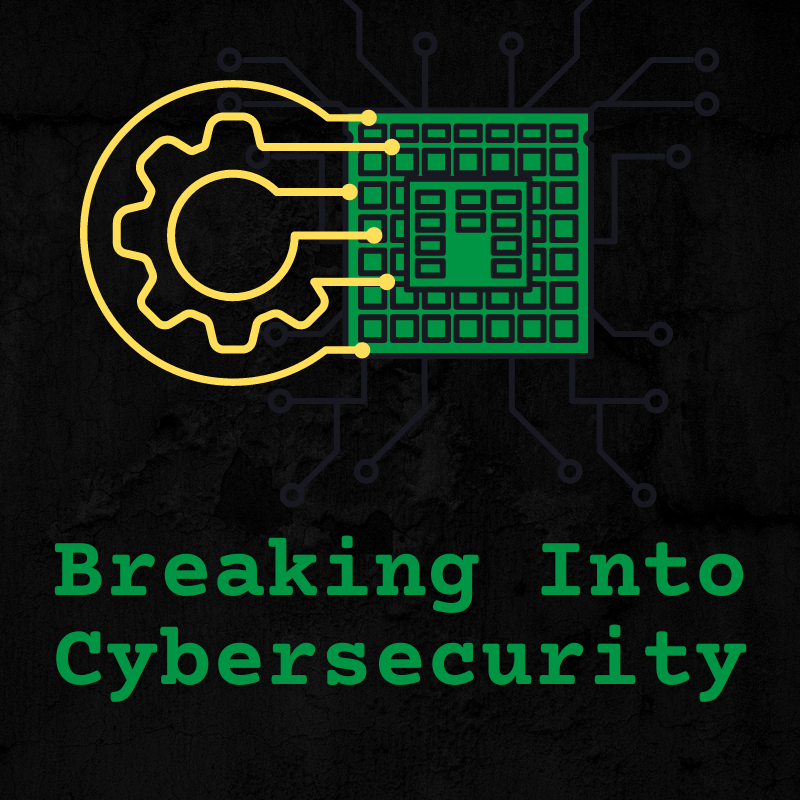Episode 3
Breaking into Cybersecurity Leadership w Warner Moore
Breaking into Cybersecurity Leadership w Warner Moore
Warner Moore on Linkedin https://www.linkedin.com/in/warnermoore/
Sponsored by CPF Coaching LLC - http://cpf-coaching.com
The Breaking into Cybersecurity: It’s a conversation about what they did before, why did they pivot into cyber, what the process was they went through Breaking Into Cybersecurity, how they keep up, and advice/tips/tricks along the way.
The Breaking into Cybersecurity Leadership Series is an additional series focused on cybersecurity leadership and hearing directly from different leaders in cybersecurity (high and low) on what it takes to be a successful leader. We focus on the skills and competencies associated with cybersecurity leadership and tips/tricks/advice from cybersecurity leaders.
This podcast runs on listener support and funding. Consider supporting this podcast:
https://breaking-into-cybersecurity.captivate.fm/support
Check out our books:
Develop Your Cybersecurity Career Path: How to Break into Cybersecurity at Any Level: https://amzn.to/3443AUI
Hack the Cybersecurity Interview: A complete interview preparation guide for jumpstarting your cybersecurity career https://www.amazon.com/dp/1801816638/
_________________________________________
About the hosts:
Christophe Foulon focuses on helping to secure people and processes with a solid understanding of the technology involved. He has over ten years of experience as an experienced Information Security Manager and Cybersecurity Strategist with a passion for customer service, process improvement, and information security. He has significant experience in optimizing the use of technology while balancing the implications to people, processes, and information security by using a consultative approach.
https://www.linkedin.com/in/christophefoulon/
Find out more about CPF-Coaching at https://www.cpf-coaching.com
- Website: https://www.cyberhubpodcast.com/breakingintocybersecurity
- Podcast: https://feeds.captivate.fm/breaking-into-cybersecurity/
- YouTube: https://www.youtube.com/c/BreakingIntoCybersecurity
- Linkedin: https://www.linkedin.com/company/breaking-into-cybersecurity/
- Twitter: https://twitter.com/BreakintoCyber
- Twitch: https://www.twitch.tv/breakingintocybersecurity
Mentioned in this episode:
CPF Coaching: Cybersecurity Leadership and Talent Development Consultant
CPF Coaching: Cybersecurity Leadership and Talent Development Consultant
Transcript
Outro Music
2
:Christophe Foulon: Welcome to another
episode of Breaking into Cybersecurity.
3
:Today we have Warner Moore with us
who'll be sharing his background into
4
:cybersecurity, as well as sharing tips
and tricks of his specialty along the way.
5
:Warner, give us a little bit
of background about yourself.
6
:Warner Moore: My pleasure to be here
today, Chris, and thanks for having me.
7
:I normally say my background is tech
and cybersecurity which is quite true.
8
:I started my career in the early
days of the internet focusing on the
9
:bleeding edge of technology, which.
10
:Really drove me towards, as technology
changed towards internet technologies.
11
:Back in the olden days, we called
them.com companies and over that
12
:time I helped build several business
to business softwares as service
13
:companies across industries, including
FinTech, InsureTech, and health Tech.
14
:I've often served in security
leadership roles and technology
15
:leadership roles, but security has
really been a focus in my career.
16
:And I quit counting at a certain point,
but in my time I built over seven
17
:security and or privacy programs.
18
:Christophe Foulon: And what is
it about cybersecurity and or
19
:privacy that got you hooked?
20
:Warner Moore: In the early days
of the internet it was really just
21
:a leading area of technology.
22
:A nerdy thing we like to do.
23
:Technology wasn't as secure.
24
:As it is today, which is weird to say out
loud given the common narrative and media
25
:where we're having breaches all the time.
26
:But back then, pretty much everything
we ran was fundamentally insecure.
27
:So running secure systems was difficult
and for me it was a bit of a game.
28
:I.
29
:I had a server where people
would log in directly into it.
30
:That's how we did things back then,
and it was really hardened and I
31
:challenged people to compromise it
and not maliciously, but to test the
32
:security and they were never able
33
:to.
34
:And
35
:a lot of the technologies we have today
came of that time free and open source
36
:technologies, intrusion detection systems
like Snort file Integrity monitors or fem.
37
:I've been known to call them host-based
IDS at times, and they were at
38
:the time, but not so much anymore.
39
:Tripwire and just Nessus or
early vulnerability scanning.
40
:I could go on.
41
:So many security technologies came out of
open source in early days of the internet.
42
:So it was a natural focus area for me.
43
:And privacy?
44
:I think we all have a right or
should have a right to privacy to
45
:control our data, to not share things
without our consent or knowledge.
46
:And it, it's more values and the
intersection of security where
47
:it can help enable privacy has
always been attractive to me.
48
:Christophe Foulon: So as you think about
the next generation, how do we develop and
49
:create the next generation of engineers
that will think security and privacy?
50
:Warner Moore: I think this is an
important area to focus in our profession.
51
:I, there's a lot of data out there and.
52
:Some of the sources might be questionable,
but I do think anecdotally we can all
53
:admit that there are not enough skilled
folks to satisfy all the things we need
54
:to do professionally with cybersecurity.
55
:And universities have been stepping up
and creating cybersecurity programs over
56
:the past 10 years and professionally,
we've created so many great resources.
57
:But ultimately it's not like back
in the day where you had to earn
58
:your stripes in tech and you might
luck into a specialized field.
59
:We have to make an active point to
develop young and new talent and
60
:Find ways to curate and craft in the
next generation of professionals.
61
:If we as security leaders don't
take an active part of this and
62
:supporting and enabling our companies
to develop new talent, we're not
63
:going to solve the talent shortage
for at least a decade or two to come.
64
:Christophe Foulon: And as a security
leader, how do you assess the talent that.
65
:You have on your own team before
deciding to go out and get another
66
:headcount or get another solution.
67
:Warner Moore: I think of it less from
the perspective of skill assessment.
68
:Have a great team and I'm
grateful to have them.
69
:Ultimately big part of what I do
is being able to hang out with
70
:smart folks who make an impact.
71
:It's more about Do we have enough
folks on the team to deliver what
72
:we need to do in the business?
73
:And that's how I approach not only running
a security organization, but building
74
:a security program more strategically.
75
:Are we understanding the
way the business operates?
76
:Are we understanding The goals are we
understanding the economics and the
77
:financial implications of the business?
78
:And how does our work
and security tie to that?
79
:So frequently when I'm assessing adding
to the team, it's more around do we
80
:have capacity to deliver on what we need
to do and the commitments we've made.
81
:Christophe Foulon: And as you think about,
. Out technical skills versus soft skills
82
:how would you weigh ' em in importance?
83
:Warner Moore: I've been building
technology and security teams
84
:for well over a decade and early
when I was hiring I weighed, I.
85
:Technical skills, very highly
coming from a technical background,
86
:that's easy to do, right?
87
:Valuing things that we're good at and
passionate about, and what I quickly
88
:learned is that while those who are the
best of the best, and when it comes to
89
:a particular technical skill, I think
in technical fields, we are less refined
90
:when it comes to social or soft skills
or business skills, and that, that's
91
:something I'd encourage everyone to
develop regardless of their career goals.
92
:It, it's going to enable someone who
wants to remain in a technical role
93
:to be more successful, make more of an
impact, and have less friction in the
94
:things they're trying to do every day.
95
:And once someone, and if someone
chooses to follow a management
96
:path, it's non-negotiable.
97
:And frequently soft skills are
more, or lack thereof, are more
98
:limiting in one's career journey.
99
:Then a lot of other
skills at a certain point.
100
:Later and for a long time, while technical
skills are important and necessary.
101
:Those who have better communication
skills, better listening skills the
102
:ability to collaborate cross-functionally
with team members are those who
103
:ultimately get hired and get
promoted and have more opportunities.
104
:I'll never forget a couple times where.
105
:I had the opportunity to hire some
of the best engineers in our city,
106
:if not the country and the world.
107
:And there are An ability to work in a
team collaboratively and in a way that
108
:didn't alienate people in the process,
limited my ability to hire them.
109
:And quite unfortunate.
110
:I knew it was the right decision
at the time, but it was still a
111
:very difficult decision to make.
112
:And I live by that to this day.
113
:Christophe Foulon: You hit on some of
the skills that I ask about all the time.
114
:Communication.
115
:Collaboration, and then
another one, delegation.
116
:How would you rate your
ability of those three skills?
117
:I.
118
:Warner Moore: Communication,
collaboration, and delegation.
119
:There are stu studies that show
self ratings when it comes to
120
:judging or assessing one's abilities
generally are not very accurate.
121
:I'll just take that question
off the cuff and say that.
122
:Delegation is always
something that I'm working on.
123
:It's quite nuanced and different
team members and different skill with
124
:different skills and experience levels
of different levels of abilities When
125
:it comes to stepping up when things
are delegated to them I think it's very
126
:difficult to balance between Just here
take this and walking away and never
127
:looking at it again versus handing it
over and providing the right level of
128
:support to ensure the team member is
successful and the outcome is successful.
129
:Admittedly soft skills are and leadership
skills I look at as a lifelong journey.
130
:There isn't one day where suddenly
someone's a leader or suddenly
131
:someone's a fantastic communicator.
132
:I've been actively working
on communication skills for
133
:well over a decade, and it's
something I practice and work on.
134
:Regularly to this day, and I think
that's true of most topics like this.
135
:Christophe Foulon: Now, as you think
about networking, how important
136
:is networking with people to this
career and to leadership in general?
137
:Warner Moore: Relationships
are everything.
138
:A bit of a controversial statement
is businesses are people without.
139
:being into the corporations or
people, legal or political arguments.
140
:I think that's a good way
to look at anything we do.
141
:If you're a individual contributor
do you have relationships in your
142
:profession to learn, develop skills,
refine skills, ask for help in special
143
:areas, find a new job when you need it.
144
:Know when.
145
:New job opportunities are out there.
146
:What does the market look
like in a management role?
147
:Being able to hire the right team
members knowing who can help in what
148
:areas of the organization to help you
and your team be successful in the role.
149
:On an executive level creating
awareness in the, your functional
150
:area professionally in your city, in
your country, in your profession as
151
:a whole being able to draw in the
right areas to build your team.
152
:And I could Wax poetical, on and
on about all sorts of different
153
:examples, but building relationships
is everything we do as humans.
154
:I've often met with even senior level
managers who had been in a role for.
155
:A decade plus, and I never see them at
our professional community groups or
156
:our executive meetings in the community.
157
:And then suddenly I get an introduction
out of the blue where they want help
158
:because they need a new job or they
want help because they wanna hire
159
:a special team member and at that
point I'm just meeting the person
160
:for the first time and they're
introducing themself to the community.
161
:It's best to have relationships
give and then when I.
162
:You need things folks
will be there to help too.
163
:Doing it proactively is super important.
164
:A book by Adam Grant one of my favorite
books of last year that I read is
165
:called Give and Take, and it talks all
about the science and the benefits or.
166
:Lack of benefits for those who
don't give really a fantastic book.
167
:He is a professor out of
Wharton Science-based focused
168
:on organizational psychology.
169
:Christophe Foulon: And it sounds very
similar to using influence as well.
170
:As part of that skillset how
would you describe influence and
171
:its importance to your career?
172
:Warner Moore: There's a one of my all
time favorite books is called Influence.
173
:It's a bit of a classic at this point.
174
:The, but that's a completely
unrelated I it's interesting.
175
:I normally don't think
about influence as a thing.
176
:I usually think about how I can help
folks how I can give back how I can
177
:make an impact be it team members the
organizations I work with my professional
178
:community, nonprofit community.
179
:It giving I is one of the
best ways to build influence.
180
:I, it's I how would you react?
181
:I if someone you, you don't know
asks for something out of the
182
:blue, but I if someone you've
known for a while who's helped you
183
:over time in different ways and.
184
:You've built rapport in a relationship
and they ask for help on what's
185
:your response going to be, then
you can treat it rhetorically.
186
:But I, I think that's a good
way to look at influence.
187
:Christophe Foulon: That definitely is now.
188
:. Any final words of advice for the
next generation of leaders that
189
:you hope to come behind this?
190
:Warner Moore: I often talk to
experienced engineers and technical
191
:people, and they might be thinking
of a management transition, and I.
192
:Maybe as a career progression, maybe as
a opportunity that an organization is
193
:pushing to someone towards, there's a
certain age in a career where it's almost
194
:more difficult not to fall into that kind
of work, and we don't often talk about
195
:how it's a completely different job.
196
:It, going into a management role for the
first time is a complete career change,
197
:and we don't talk about it that way.
198
:We talk about it as a profession as a
continuation of the profession we're in.
199
:That's absolutely not the case.
200
:And the soft skills we talked
about administrative skills,
201
:management skills, leadership
skills our ability to organize and.
202
:Build teams and help people be successful.
203
:It's not about our ability to
get things done personally.
204
:In fact, a default reaction for
somebody in that position if the
205
:team's not performing might be
to do the work yourself, which
206
:is the exact wrong thing to do.
207
:So those management is a career change.
208
:And it's not an a technical role, and
it's important to weigh that very heavily.
209
:And if someone wants to make that
journey, and it will be a journey, look
210
:at it that way and be prepared to start.
211
:New and it's going to be a learning
journey, and there will be a lot of folks
212
:who hopefully can help along the way.
213
:I wish everyone the best of luck,
It's not an easy path, but a lot of
214
:folks can be very effective at it.
215
:Christophe Foulon: Thank you.
216
:I think we definitely need a diverse
. Group of individuals that help lead as
217
:well as help engineer 'cause we need
that diverse perspective to challenge
218
:and tackle the problems of tomorrow.
219
:Warner Moore: I couldn't agree more.
220
:Often the best engineers should stay.
221
:The best engineers.
222
:That's.
223
:Much more coveted skillset,
and there are a lot of managers
224
:out there, and many of them are
earlier in their learning journey.
225
:So if you're really good at
something and you like it, do
226
:you want to make that change?
227
:It's not only a question to ask, it's a
decision to make before taking the leap.
228
:Christophe Foulon: It is.
229
:Thanks everyone for joining us
and have a great rest of your day.
230
:Warner Moore: Such a pleasure.
231
:Take care everyone.
232
:Feel free to reach out on
LinkedIn and mention this podcast.
233
:Always happy to chat.
234
:I.





